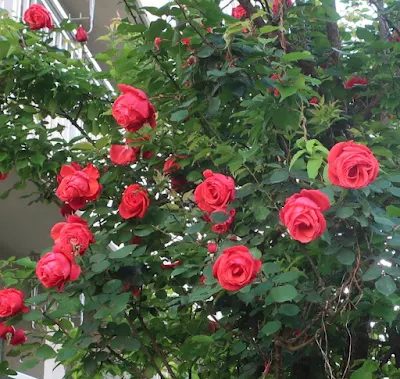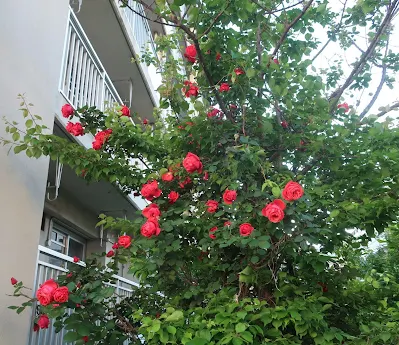Hi! I'm Kei Narujima. This is a blog about flowers/plants🌼and bugs🐛, and sometimes art and unique Japanese culture that make you smile or think (or so I hope)!! こんにちは。花や虫、そして時々日本の文化などについて書いてます😊。税務英語については https://zeimueigo.blogspot.com/ をご覧ください。
Persimmon 柿(カキ)
Can you tell what this is? If not, take a look at the second photo of a flower and calyxes! Yes, this is a persimmon flower. Until I saw the flower yesterday I hadn't imagined the persimmon produced flowers (although I've eaten the fruit countless times)!!
I learned from the internet that the persimmon produces male, female and hermaphrodite flowers and it seems that these flowers in these photos are hermaphroditic, meaning having male and female reproductive organs within the same flower. The persimmon's world is so diverse!
A Large and Old Rose Tree 大きくて古い薔薇の木
Pale Green Kousa Dogwood (Cornus Kousa) 薄緑の山法師(ヤマボウシ)
Since I learned that Cornus kousa was named after Enryakuji temple monks in Japanese (i.e., "evergreen Buddhist monk"; read this post to know why), I've been looking for a flower that looks like such a monk. Take a look at the 3rd photo! Do the flowers look like Enryakuji temple monks to you😊?
 |
| Cornus kousa 薄緑のヤマボウシ |
Nomura Maple (Acer Palmatum 'Shojo Nomura') Leaves Turn Red in Spring 野村紅葉(ノムラモミジ)
This is a nomura maple tree (Acer palmatum 'Shojo nomura'). I've heard about the tree famous for its leaves turning red in spring but didn't expect to find one in my neighborhood! It may be difficult to see the seeds, which look like Doraemon bamboo copters, but they're also bright red (3rd and 4th photos)! If you're interested in another type of acer whose leaves also turn red in spring (i.e., weeping maple), read this post, too!
Lamium Album (White Dead-Nettle) 踊子草(オドリコソウ)
These are Lamium album, commonly called white dead-nettle at the Imperial Palace East Garden. The translucent whitish pink, hairy petals are so pretty! I've walked around the Imperial Palace many times and my office is very close to it but I've never entered the garden. I'd assumed that the garden had only old stone walls and gravel roads but I was wrong! It has many old trees (including a gigantic flowering dogwood tree) and various flowers! In addition, the admission is free! How could I miss it?
Gigantic Cornus Florida 巨大な花水木
"Gigantic!!" That's what I said when I first saw it. This is a flowering dogwood tree (Cornus florida) growing by the Chidorigafuchi moat (i.e., the mort of the Imperial Palace). I see cream white and red flowering dogwood trees every day these days, but the tree is different!! The moat was built in the early 17th century, so the tree may be older than 400 years old??😉
White Kousa Dogwood (Cornus Kousa) 山法師(ヤマボウシ)
These are flowers of Cornus kousa or more commonly known as kousa dogwood. There're dozens of white and red flowering dogwood trees (Cornus florida) but as far as I know, only a few kousa dogwood trees in my neighborhood. I don't know why.
Kousa dogwood is called "evergreen Buddhist monk" in Japanese by comparing the head (or capitulum) of the flower to the head of a monk of the Hieizan (Mt. Hiei) Enryakuji temple and the four bracts surrounding the capitulum to his hood.
 |
| Kousa dogwood 山法師 |
Cotoneaster コトネアスター
I first thought they were Spiraea thunbergii but the leaf shape is different. I googled it and found they're Cotoneaster. But not only that, I also found two inchworms (2nd and 3rd photos) on the flowers. Spring is for not only plants but bugs, too!!
Weigela Hortensis 谷空木(タニウツギ)
These are Weigela hortensis in two places. I said two places because the flower color was different. I love not only these bright and pale pink flowers but the bright green leaves with red edges!
Magnolia Figo (Banana Shrub) 唐種招霊(カラタネオガタマ)
I've seen several types of Magnolia, like yulan magnolia, mulan magnolia, and southern magnolia, so I knew that this was some kind of Magnolia, but couldn't tell what magnolia until searching for its name on the internet. This is Magnolia figo or more commonly known as banana shrub. Many websites say that the flower smells like banana. I need to go there again tomorrow to see if that is true!
Three-Cornered Garlic (Allium Triquetrum) 三角葱(ミツカドネギ)
These are three-cornered garlic flowers (Allium triquetrum). I saw these pretty flowers a week ago on one of @gabriellalaure's Instagram posts and then found them in my neighborhood today a week later. As @gabriellalaure says, the plant is edible and eaten in Japan although I've never tried one.
 |
| Three-cornered garlic 三角葱 |
Creeping Woodsorrel (Oxalis Corniculata) 酢漿草(カタバミ)
I saw this creeping woodsorrel (Oxalis corniculata) a few days ago. The bright yellow flower is just 1 cm in diameter, so tiny that it may have been unnoticed. But I was able to find it because I looked down when walking. The cherry blossom season is over, so I no longer have to look up as I walk.
On a separate note, you may have heard of a very old song titled "Sukiyaki." The song was sung by A Taste of Honey in the U.S., topping the U.S. Billboard Hot 100 chart in the 1960s, but it was originally a Japanese song and the title isn't "Sukiyaki" but "I Look Up as I Walk," unlike me, who often looks down while walking! On another note, I much prefer "Boogie Oogie Oogie" to "Sukiyaki"😆
Red Flowering Dogwood (Cornus Florida) 赤い花水木(ハナミズキ)
Flowering dogwood (Cornus florida) is so lovely because of the cute shape although unlike the cream white flowers, these red flowers don't look like mandu dumplings😋!
I've seen red and white cream flowering dogwood, so the remaining is green one!
Weeping Maple Flowers and Red "Spring" Leaves 紅枝垂れ紅葉(ベニシダレモミジ)の花
Cherry Blossoms Change from Yellow to Pink (Cerasus Sato-zakura Group ‘Grandiflora’ A. Wagner) 黄とピンクのウコン(鬱金)
I wrote about the yellow cherry Ukon last week and at that time, the blossoms were still yellow, but now they've started to change to pink!! I love this cherry for not only the unique color of its blossoms but their change from yellow to pink!!
Below are cherry blossoms I've seen this spring. If you're interested in them, read these posts, too!!
- Taiwan cherry (Prunus campanulata)
- Cherry laurel (Prunus laurocerasus)
- Kawazu cherry (Cerasus lannesiana)
- Pink & white Oshima cherry (Prunus speciosa)
- Weeping cherry blossoms
- Somei cherry (Prunus x yedoensis)
- Double Pink Flowered Cherry Blossoms
- Yellow cherry Ukon (Cerasus Sato-zakura Group ‘Grandiflora’ A.)
- Sato zakura cherry
Deutzia Gracilis (Slender Deutzia) 姫空木(ヒメウツギ)
These are flowers of Deutzia gracilis or the slender deutzia. The plant is named "hime utsugi (meaning princess empty tree)" in Japanese after its smaller size than other deutzia and straw like (empty) stems.
Sato Cherry Blossoms Die Hard 里桜はしぶとい
These are Sato cherry blossoms (Cerasus sato-zakura group), surprisingly still in full blossom after a windy and rainy day!!
Below are cherry blossoms I've seen this spring. If you're interested in them, read these posts, too!!
- Taiwan cherry (Prunus campanulata)
- Cherry laurel (Prunus laurocerasus)
- Kawazu cherry (Cerasus lannesiana)
- Pink & white Oshima cherry (Prunus speciosa)
- Weeping cherry blossoms
- Somei cherry (Prunus x yedoensis)
- Double Pink Flowered Cherry Blossoms
- Yellow cherry Ukon (Cerasus Sato-zakura Group ‘Grandiflora’ A. Wagner)
Forget-Me-Not (Myosotis) and a Bug! 勿忘草(ワスレナグサ)とちっちゃい虫
An Instagram friend of mine, @rieo_pomegranate23, commented that forget-me-not buds are pink but its flowers are purple, so I went there again to see if that's true and I found that was true and also a tiny bug resting on one of its leaves! This is my first photo of a bug this year!!
 |
| Forget-me-not and a bug! 勿忘草とちっちゃい虫 |
Galls Look Like Caterpillars! (Tuberocephalus Tsengi)😱! 葉縁袋五倍子(ハベリフクロフシ)😱!
Yellow Cherry (Cerasus Sato-zakura Group ‘Grandiflora’ A. Wagner) 黄色の桜「鬱金」
英語の後に日本語が続きます。
The cherry blossom season in Tokyo will soon be over, but you can't or shouldn't end the season without seeing them! They're yellow cherry blossoms or Ukon cherry (Cerasus Sato-zakura Group ‘Grandiflora’ A. Wagner)!! I've enjoyed them for the last three years, but they still amazes me.
Below are cherry blossoms I've seen this spring. If you're interested in them, read these posts, too!!
Male Flowers of Akebia Quinata (Chocolate Vine) 木通(アケビ)の雄花
These are male flowers of Akebia quinata or commonly known as chocolate vine. I wrote about the plant last month but the post (and the photos in it) was mainly about the female flowers. Then, yesterday I found these. Look at the pink and purple striped flowers! I couldn't help but write about them!
Double Pink Flowered Cherry Blossoms 八重桜
They're double flowered cherry blossoms. Cherry trees generally bloom from early February (e.g., Kawazu cherry and Taiwan cherry) to mid-to late March (e.g., Oshima and Somei cherry trees), then early April (e.g., double-flowered cherry and mountain cherry). So, the blooming of double flowered cherry trees means the cherry blossom season this year will soon be over. But before that, enjoy these pretty "chubby" blossoms!!
Below are the cherry blossoms I've seen this year. If you're interested in them, read these posts, too!!
Flowering Dogwood (Cornus Florida) 花水木(ハナミズキ)
Flowering dogwood has started to flower!! They're beautiful but also remind me of mandu dumplings😋
 |
| Flowering dogwood 花水木 |
 |
| Cornus florida ハナミズキ |
Grape Hyacinth (Muscari) ムスカリ(葡萄風信子)
英語の後に日本語が続きます。 Grape hyacinth (Muscari) is native to Eurasia but can be found across Japan, producing flowers from March to April in the co...

-
英語の後に日本語が続きます。 I read "A Pale View of Hills" by Kazuo Ishiguro a few years ago. The book was my second Ishiguro's book after...
-
Japanese follows English. 英語の後に日本語が続きます。 Is he being boiled to death? (This is a revised version of the story originally posted on Se...











































